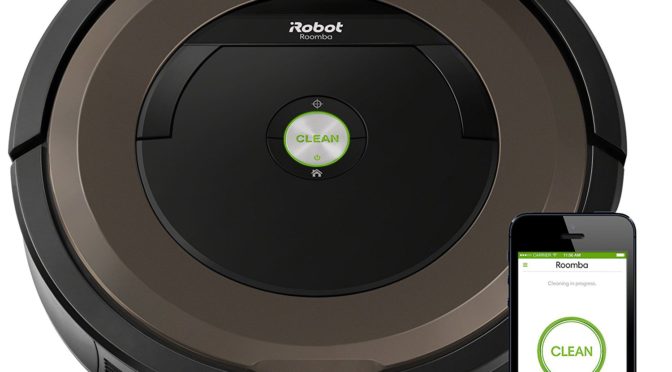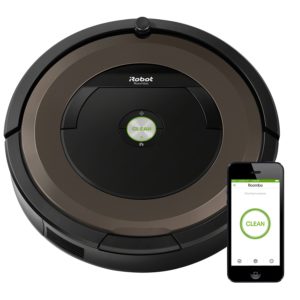
If you’re burnt out on manually vacuuming or simply want to reclaim some of your home back from hordes of dust, dirt, and pet hair, an automatic vacuum might be for you. We’ve been reviewing several lately (e.g., the Roomba 690 and Deebot N79), and the bad news is that most of our future robotic overlords aren’t nearly smart enough yet to replace human beings in all cleaning tasks. However, if you want to take another step up in robotic intelligence and have $500 to spend, the iRobot Roomba 890 Robot Vacuum will probably please you. Is it worth buying? We think so. Our full review is below, and you can buy it here.
Pros, Cons, and Key Features of the iRobot Roomba 890 Robot Vacuum
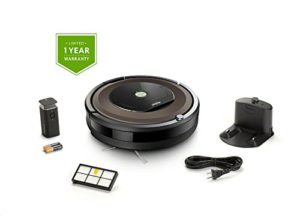
The Roomba 890 Robot Vacuum is the middle child of the Roomba family; it’s smarter than the Roomba 614 and Roomba 690 but not as smart (or good looking) as the Roomba 960 and Roomba 980. However, like Jan in The Brady Bunch, it has enough going for it to make it worth buying. Key features include Wi-Fi and smart phone connectivity as well as compatibility with voice-activated systems (e.g., Amazon Alexa, Google Assistant). The 890 is also battery-powered and fully programmable.
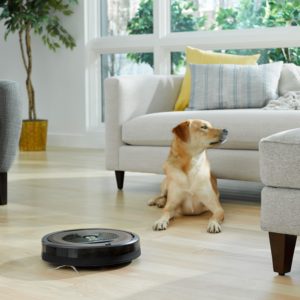
In the box, you’ll find the Roomba, a home base charging station that the Roomba returns to whenever in need of a recharge (as long as it’s on the same floor), a virtual wall barrier with required AA batteries included, and your documentation, including the one year warranty. Your Roomba will also arrive with a partial charge, allowing you to start using it immediately, although we recommend charging it completely so you get the full experience once it’s ready.
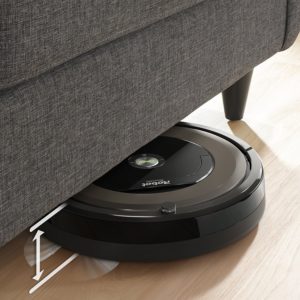
The built-in Lithium-ion battery requires approximately 3 hours to charge and the Roomba lasts around 60 minutes on a charge. It requires a minimum of 3.6 inches of clearance to clean beneath furniture and bedding and has a 13 inch cleaning radius. The Roomba 890 weighs 8.4 pounds. Pros include greater navigational abilities, increased suction, and better filtering compared to the Roomba 690; cons include a lack of visual navigational cameras and “recharge and resume” features compared to the Roomba 960 and 980. It also lacks a remote, meaning you’ll need to either use your phone or buy a separate one for remote control. Without the remote, you can’t specifically point the Roomba toward areas it keeps missing, although it’ll eventually get to them on its own.
How do you set up your Roomba app so your smart phone can control it?
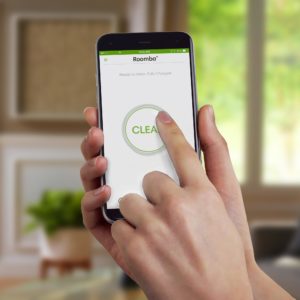
Phone setup via the app is straightforward. It’s compatible with Apple and Android devices; download the appropriate iRobot app and install it. You’ll need your name and email address to register your Roomba; you can also name it, which is handy for telling them apart if you buy multiple models to deal with multiple floors. You can of course just use one, but you’ll need to carry it up and down the stairs.
To sync your Roomba and home Wi-Fi, you’ll need to connect your Roomba to its docking station; it won’t sync without being at its home base. Also keep in mind that you’ll need 2.4GHz Wi-Fi to connect; 5GHz Wi-Fi won’t work, so make sure your phone and router are in the correct band. It should connect immediately afterward, and with the app, you’ll be able to talk to the Roomba remotely in terms of telling it when to clean (either immediately or with a 7-day schedule). You can also look up cleaning jobs and read about how to maintain and clean the Roomba itself.
How well does the Roomba 890 clean carpets and hardwood floors?
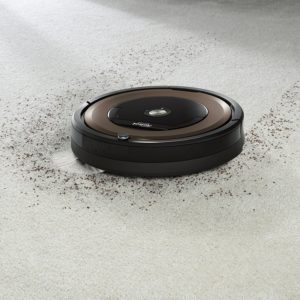
The Roomba 890 was capable of cleaning hardwood floors (as well as other bare floors like tile, laminate, vinyl, and concrete) with ease; it picked dirt, pet hair, and debris up easily and noticeably more efficiently than the 600-series Roombas. This makes sense when considering that iRobot specifically touted the enhanced suction power of the 890 compared to the lower-series Roombas. The low height allowed it to neatly sneak under furniture (chairs, tables, beds, cabinets, couches) and clean beneath them before zooming out on its somewhat random course around your living room (or wherever you have it set up).
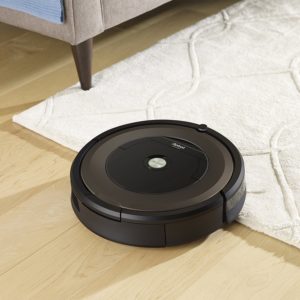
As good as the 890 was on low-pile rugs and carpets,like the lower Roombas, it was still incapable of cleaning medium-pile and high-pile carpeting, but that’s generally the case with all robotic vacuums. To be frank, when it comes to cleaning high pile or soft pile carpets, if you don’t have something like a Soft Carpet or at least an Electro+ (basically a vacuum with an electric brush head), you’re going to struggle, so we can’t hold that against the 890. It cleaned in a somewhat odd pattern reminiscent of the mapping used by the lower Roombas, but it seemed to zig-zag less and take less time to clean the same sized rooms than the 614 and 690.
How often does the Roomba 890 get stuck, fall, or tip over?
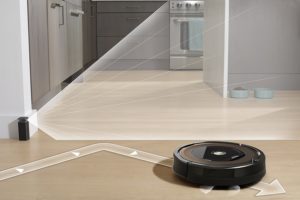
The 890 rarely gets stuck and almost never falls or tips over, although the specifics will naturally vary from one home environment to the next. The 890 is definitely smarter than the 690 and 614, and did a better job of avoiding problem areas while cleaning as close as possible to them. It also includes a virtual wall barrier to “block off” certain parts of your home where you’d rather it not clean (e.g., by your cat or dog food and water bowls). That said, while the navigation was significantly better than that in the lower Roombas, it wasn’t at the level of the 900-series Roombas, which seemed to have more efficient ways of getting around rooms (and also had the capacities to go from room to room).
How does the Roomba 890 compare to the Roomba 960 and 980?
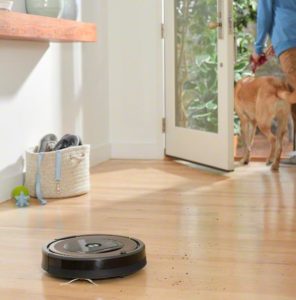
Compared to the Roomba 960 and Roomba 980, the main things missing in the 890 are additional intelligence and convenience. The 960 and 980 have sophisticated camera-based tracking systems that allow them to navigate rooms more quickly and with greater accuracy. The 980 in particular includes a remote, extra cleaning brushes to pick up debris more efficiently, a much larger battery (120 minute vs 60 minute runtimes), multi-room cleaning, and resume and recharge features, which allow the vacuum to return to its base to charge fully and then continue the job until it’s fully done. The 960 includes some, but not all of the above features. If you can live without what we just described above, save yourself some money and stick with the 890. If not, you know what you need to do.
Why buy the Roomba 890?
If you’re going to spend $499 on a robotic vacuum, it’d better do a better job of cleaning and working automatically than the various budget models out there. Fortunately, the Roomba 890 delivers on both measures. While its navigational system isn’t perfect, it’s significantly better than that in the lower Roombas and the vacuum feels very sure-footed in comparison to cheaper models. The main features we miss are the much higher levels of navigation and autonomy present in the Roomba 960 and 980, as well as longer warranty coverage, which we’d like to see at this price range.
![]() You can buy the Roomba 890 here on Amazon. Alternatively, the Roomba 960 is available here and you can buy the Roomba 980 here if you really want the shining star of the Roomba family.
You can buy the Roomba 890 here on Amazon. Alternatively, the Roomba 960 is available here and you can buy the Roomba 980 here if you really want the shining star of the Roomba family.
![]() Canadians can buy the Roomba 890 here, the Roomba 960 here, and the current top Roomba, the 980, here.
Canadians can buy the Roomba 890 here, the Roomba 960 here, and the current top Roomba, the 980, here.
 If you find our research on PMC helpful, you can follow our efforts to keep maniacally reviewing home cleaning tools by shopping through our links above. We promise to keep fighting the good fight against every horror children, animals, and grown, yet messy humans can inflict upon a clean home.
If you find our research on PMC helpful, you can follow our efforts to keep maniacally reviewing home cleaning tools by shopping through our links above. We promise to keep fighting the good fight against every horror children, animals, and grown, yet messy humans can inflict upon a clean home.

